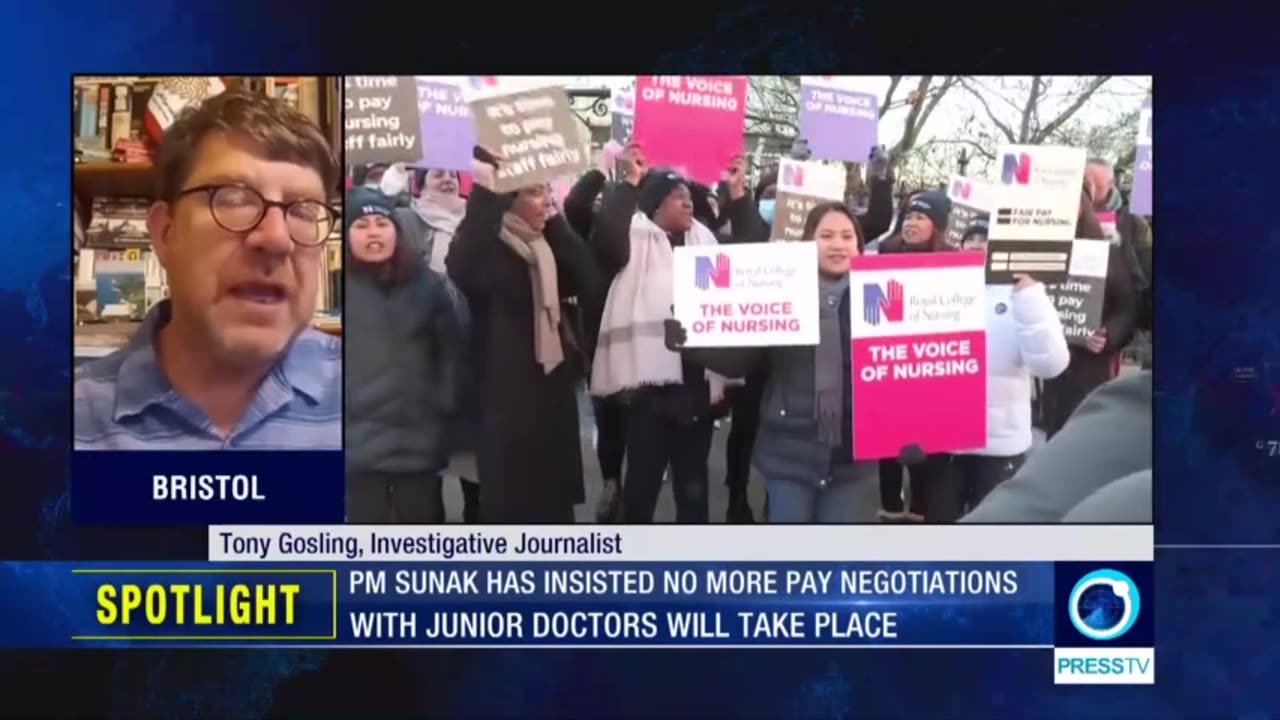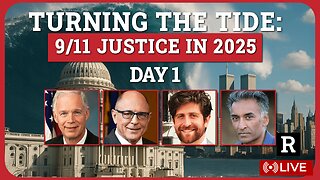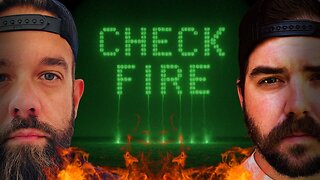Premium Only Content

UK economic slump, strikes necessary or health, schools, railways hemorrhaging staff, will disappear
UK economic woes
Across the board, from white collar to blue collar workers, few seem satisfied with their jobs in the United Kingdom. From train drivers to ambulance driver, lawyers, and doctors, just about everyone is demanding better working conditions and an increase in salaries. Industrial strikes have become common, but few have had desired results. What’s going in the UK and what is next for the British people?
This edition of the Spotlight program is about the economic woes faced by the UK. The program looks at industrial actions staged by workers and doctors.
https://www.presstv.ir/Detail/2023/08/13/708889/UK-economic-woes
‘Overworked and undervalued’: why junior doctors in England are striking
Thousands of junior doctors are walking out between July 13 and 18, in the longest single strike in NHS history
Kirsty is a junior doctor. She’s 25 and right at the beginning of her career, but she doesn’t feel any excitement about her prospects in the NHS. Instead, when she thinks about the future of her working life, she’s filled with anxiety. “It’s not a secret that the NHS has not had the funding it needs for decades,” she tells me. “I’m sure anyone who has come to hospital recently will have experienced longer wait times, difficulty getting appointments, slower care. And if the government continues to not prioritise NHS workers, eventually, they won’t have the staff to run it at all.”
Kirsty is one of thousands of junior doctors who will be taking part in the five-day walkout between July 13 and July 18, the longest single strike in NHS history. This latest action follows a series of strikes this year, with the majority of British Medical Association (BMA) members consistently voting in favour of strike action.
The BMA’s members said they had taken the decision to strike because they feel “overworked and undervalued”. They’re demanding a new pay increase of 35 per cent to make up for inflation in the past 15 years, which has cut junior doctors’ real terms earnings by 26 per cent. “Many people do not realise the reality of being a junior doctor. A new junior doctor starts at only £14 per hour,” Alex, a 29-year-old striking junior doctor says. He adds that junior doctors are also made to pay professional fees and exam fees, which can add up to thousands of pounds. Many doctors also face long, costly commutes to work, and those who drive in are made to pay for parking once they’re at the hospital. Additionally, student debt for a doctor can be up to £90,000 due to the sheer length of their studies. It’s easy to see how these hidden costs quickly add up.
The strike isn’t just about pay and the financial toll of pursuing a career as a doctor, though. Alex also mentions the stress of regularly moving workplaces and “difficulty in life planning more than a few months ahead”. The day-to-day work too is, obviously, intensely emotionally draining. Recent research from the University of Leeds found that many NHS junior doctors suffer panic attacks and experience intrusive thoughts, migraines and hair loss as a result of work-related stress. Separate research from the GMC found that there were an increasing number of medical trainees experiencing burnout, with one in five junior doctors at high risk of burnout in 2022, compared to one in seven in the previous year.
Kirsty explains that a ‘normal’ day at work for doctors can be incredibly difficult. “I’ve been verbally abused, I’ve had multiple people try and hit me, I’ve been bled on, thrown up on, I’ve given CPR to three patients in the space of a few hours... and then I’ve just had to continue helping the other 20 patients left on my list, like all the other doctors I know,” she says. She stresses that she doesn’t “resent” any of this – “I knew the job I was choosing and it’s the only one I’ve ever wanted to do,” she says. But she explains that she just wants the government to understand the challenges doctors face and treat them with the respect they deserve.
“Striking for fair pay is about being valued by the government for the job we do,” she says. “When you cancel out inflation, I’m paid 26 per cent less than a doctor doing my job 15 years ago. Our pay has decreased and yet we work harder and harder to give patients the best care we can, despite all the NHS crumbling around us.”
It’s self-perpetuating: the worse pay and conditions get, the fewer people train as doctors and the more doctors leave the profession, and the resulting staff shortage exacerbates conditions by placing more pressure on the remaining staff. Essentially, something needs to change, or the situation is only going to get worse: a survey published in December 2022 found that 79 per cent of junior doctors often “think about” leaving the NHS, while four in ten are actively planning to leave the profession as soon as they can find another job....
-
 5:44:49
5:44:49
Redacted News
12 hours agoTurning the Tide: 9/11 Justice in 2025 — Day 1 with Sen. Ron Johnson, Richard Gage and More
183K78 -
 2:48:00
2:48:00
TheSaltyCracker
10 hours agoYou're Being Hunted ReeEEStream 9-10-25
302K612 -
 13:09:56
13:09:56
LFA TV
23 hours agoBREAKING: CHARLIE KIRK ASSASSINATED - WEDNESDAY 9/10/25
386K128 -
 1:31:08
1:31:08
I_Came_With_Fire_Podcast
10 hours agoCheck Fire: God Bless Charlie Kirk
100K27 -
 1:13:35
1:13:35
Glenn Greenwald
12 hours agoCharlie Kirk Assassinated; NATO Alleges Russian Drones Flew Over Poland, and More | SYSTEM UPDATE #512
299K309 -
 1:46:28
1:46:28
Badlands Media
1 day agoAltered State S3 Ep. 45: The Assassination of Charlie Kirk
173K29 -
 8:56:53
8:56:53
Dr Disrespect
18 hours ago🔴LIVE - DR DISRESPECT - THE FINALS - NEW SEASON 8 LAUNCH EVENT W/ THE SHOTTY BOYS
289K11 -
 27:00
27:00
BonginoReport
13 hours agoRest In Peace Charlie Kirk - Nightly Scroll w/ Hayley Caronia (Ep.131) - 09/10/2025
269K417 -
 1:20:06
1:20:06
Kim Iversen
13 hours agoRIP Charlie Kirk: When Words Fail, They Reach for Guns
191K356 -
 2:47:04
2:47:04
DDayCobra
14 hours ago $18.60 earnedCharlie Kirk SHOT
161K65